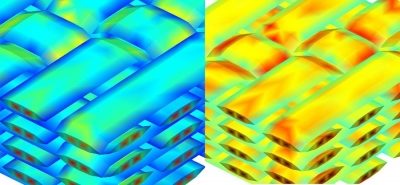Siemens Acquires MultiMechanics, Inc.

Siemens recently announced that it has signed an agreement to acquire MultiMechanics, Inc., developer of MultiMech finite element software that helps companies virtually predict failure in advanced materials at an unprecedented level of speed and accuracy. The company plans to integrate MultiMechanics into Siemens Digital Industries Software, which will add the ability for customers to create a digital twin of materials by closely integrating materials engineering with part design, performance engineering, and manufacturing through the unique TRUE Multiscale technology for a broad range of material-driven applications. MultiMechanics’ technology helps companies to efficiently predict material properties and behavior, including failure starting at the microstructural level, at an unprecedented level of speed and accuracy. This unique technology will be incorporated into Simcenter software within Siemens’ Xcelerator portfolio, implementing materials engineering into the digital workflow and establishing a pervasive link between material developers, manufacturing process developers and part designers.
“The addition of this technology enables our customers to build a digital twin of materials, which will help to shrink the innovation cycle of new products and materials, possibly saving millions of dollars and several years in development and certification in aerospace, automotive and other sectors,” explains Jan Leuridan, senior vice president, simulation and test solutions, Siemens Digital Industries Software. “Customers will have the ability to fully exploit the potential of advanced materials to optimize weight and performance in an efficient way that is not possible with classical, test-based, approaches.”
“We are excited to join Siemens and the Simcenter family,” says Flavio Souza, president and CTO, MultiMechanics, Inc. “The combination of the TRUE Multiscale technology of MultiMechanics with Simcenter 3D software will provide a strong basis for further innovation, enabling an expansion of scope of structural simulation to include multi-physics support for applications such as minimization of part distortion, prevention of voids during material flow, and prediction of visco-elastic acoustic properties.”
Digitalization, or the fourth industrial revolution, is happening today, causing disruption in the process and discrete industries, and blurring boundaries between domains, merging the virtual and real world, hardware and software, and design and manufacturing. In this dynamic environment, the ability to meet rapidly changing consumer preferences and requirements with insights and data is essential and can only be achieved through digital twins that represent and validate what is possible through a complete end-to-end workflow. Siemens‘ acquisition of MultiMechanics further expands the ability to create the most comprehensive digital twin by integrating structural computer-aided engineering (CAE) with detailed materials modeling through TRUE
Multiscale technology, for a broad range of materials, including polymers, metals, composites, and ceramics. Manufacturing technologies such as injection-moulding and additive manufacturing will see immediate applications, as the digital twin of materials can account for manufacturing variability and imperfections, identify the root cause of material failure at microstructure level, optimize material microstructure for best performance, and enable the creation and virtual testing of new material systems.
“We are confident that as part of Siemens, MultiMechanics’ technology can accelerate innovation in, and adoption of, complex materials, including the further penetration of composites in the automotive and aerospace industries,” said Nicolas Cudré Maroux, chief technology officer of Solvay, a major customer and shareholder of MultiMechanics.
“The accuracy and speed afforded by MultiMechanics, and its efficient integration with commonly used commercial finite element software packages is changing the way we develop new materials and interact with our customers,” added Mike Blair, EVP research and innovation composite materials at Solvay.





